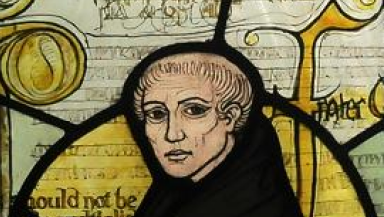Today is the Anglican feast day of William of Ockham, a medieval theologian famous for the 'razor' that also bears his name. Who was he and what did he teach?
Born in Ockham, Surrey, in 1287, the young William soon joined the Franciscan order, where he excelled in the study of theology and philosophy. He went on to study at Oxford, and became a known scholastic commentator, but arguably too well-known. His writings were judged heretical by church authorities of the day, and he was sent to Avignon, France, to defend himself before Pope John XXII, with whom he clashed. According to the Stanford Encyclopaedia of Philosophy, Ockham had ended up declaring the Pope himself to be a heretic.

After fleeing Avignon for Italy, he was later excommunicated for leaving without permission. He resided in Munich with his fugitive allies until his death at age 60 on April 9 orr 10, 1347.
Ockham left a titanic philosophical legacy, himself developing the work of his influential predecessor John Duns Scotus. He is known in academic circles particularly for his development of 'nominalism', a system of thought which rejected the notion of transcendent 'universals'.
Instead, he argued, what we imagine as 'universal properties' or 'forms' (for example, a universal property of 'yellowness') are just mental constructs (The Latin nomina meaning simply 'name') the only things that really exist are individuals.
This approach emphasised simplicity and focussed on experience as a grounding for knowledge. Connected to this, on a more popular level, the philosopher is known for 'Occam's (as his name is also spelled) Razor', an oft-cited problem-solving principle that posits that the simplest solution (the one with the fewest assumptions) to a problem is the correct one.
It is less concerned with 'truth' than it is determining probability and useful predictions. 'The 'razor' refers to the idea of either 'shaving away' excessive elements or 'cutting apart' (discerning between) two solutions. In Ockham's words: 'Plurality must never be posited without necessity' and 'It is pointless to do with more what can be done with fewer.'
This principle of economy prioritises the known over the unknown, and as such was influential for empirical, scientific modes of hypothesis. In more contemporary language, the razor suggests that 'simpler solutions are generally better than complex ones', and has served not just as a scientific maxim but a common-sense guide for everyday problem solving.
Although this in this regard William might be regarded as leaning towards rationalism, when it came to the existence of God he was a fideist: he didn't believe it could be proved by logic or reason, but only apprehended by faith and divine revelation.













